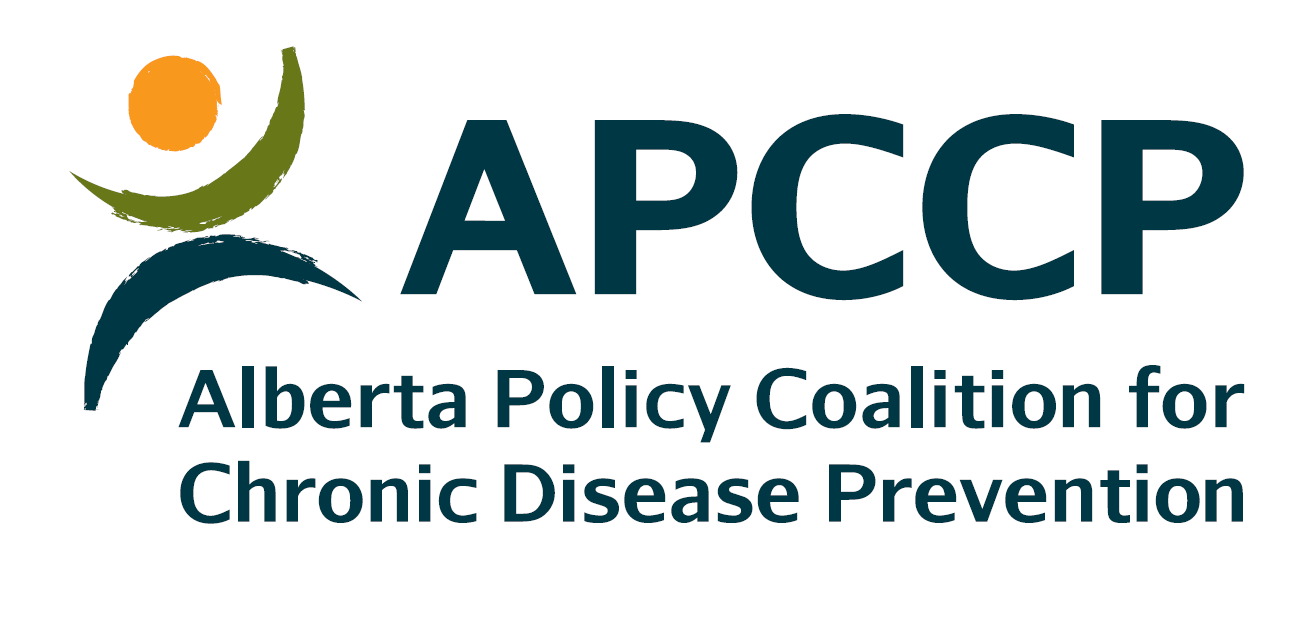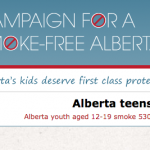EDMONTON – A recent survey of the Alberta public found that the majority of respondents support a tax on pop and energy drinks.
Sugary drinks, including pop and energy drinks, have been linked to serious health problems, such as obesity, heart disease, hypertension, and diabetes (1-6). Evidence suggests that a tax on sugary drinks can reduce consumption of these unhealthy products (7). A tax on sugary drinks also has the potential to generate significant revenue for the province, a portion of which should be reinvested in health promotion initiatives (8, 9).
According to the 2016 survey, the majority of respondents (58%) support a tax on pop and energy drinks. The survey was completed by 1200 Albertans.
“Support for a tax on sugary drinks in Alberta is not surprising, given the global momentum building around this issue,” said Dr. Candace Nykiforuk, Co-lead of the Alberta Policy Coalition for Chronic Disease Prevention (APCCP) and Professor at the University of Alberta, School of Public Health. In 2015, Mexico implemented an excise tax on non-dairy and non-alcoholic beverages with added sugar (10). More recently, in October 2016, the World Health Organization endorsed sugary drink taxation as a strategy to lower consumption and reduce health problems, such as obesity, type 2 diabetes, and tooth decay (11). Further, following the 2016 United States election, four American cities voted in support of a sugary drink tax (12).
Here in Alberta, the APCCP is advocating for a 50 cent per litre tax on sugary drinks in the province. A 50 cent per litre tax is substantial enough to reduce sugary drink consumption, as well as provide funding for health promotion initiatives, such as school nutrition and physical activity programs (8, 9).
“Given the current economic climate and burden of chronic disease, it’s time for the province to seriously consider a tax on sugary drinks,” noted Dr. Kim Raine, APCCP Co-lead and Professor at the University of Alberta, School of Public Health. “It’s a win-win.”
The 2016 survey was conducted by researchers at the University of Alberta, School of Public Health as part of the POWER UP! project. The APCCP was a partner on the POWER UP! project from October 2013 to 2016.
-30-
To arrange for an interview: please contact Kayla Atkey at 780-492-0493.
Available Spokespersons
- Dr. Kim Raine, APCCP Co-lead, Professor and Associate Dean (Research), University of Alberta, School of Public Health
- Dr. Candace Nykiforuk, APCCP Co-lead, CIHR/PHAC/AI-HS Applied Public Health Chair and Associate Professor, University of Alberta, School of Public Health
About the APCCP
The APCCP is a coalition of prominent health organizations from across Alberta who have come together to coordinate efforts, generate evidence, and advocate for policy change to reduce chronic disease in Alberta. For more information on the APCCP and its members, please visit: www.apccp.ca
Quotes from APCCP Members
“If Alberta was to lead the way with a tax on sugar-sweetened beverages to help keep our residents healthy, this would signal a strong message to the rest of Canada to take action. The Canadian Diabetes Association has been advocating for a tax on sugar-sweetened beverages, because of the clear evidence of a direct link between excessive consumption of these types of beverages and an increased risk of developing type 2 diabetes.”
– Scott McRae, Regional Director for Alberta and Northwest Territories, Canadian Diabetes Association
“We are awash with sugary drinks. Their over-consumption is promoted with large portion sizes, store aisles overflowing with the drinks, and marketing all around us, including Santa encouraging us to have a happier holiday by drinking them. Drinking too many sugary drinks won’t make you happier, but it will increase your risk of chronic disease.”
– Kate Chidester, Vice President of Advocacy, Health and Research, Heart and Stroke, Alberta, NWT & Nunavut
“The link between drinking sugary beverages and the development of obesity, heart disease, and diabetes is well established. One in four children in Canada consumes at least one highly sweetened drink every day. It’s time to take steps to protect children from unhealthy behaviours that lead to obesity and these chronic, negative health outcomes.”
– Karen Boyd, Regional Executive Director, Dietitians of Canada, Alberta and the Territories Region
References
- Vartanian LR, Schwartz MB, Brownell KD. Effects of soft drink consumption on nutrition and health: a systematic review and meta-analysis. American Journal of Public Health. 2007 Apr;97(4):667-75.
- Ludwig DS, Peterson KE, Gortmaker SL. Relation between consumption of sugar-sweetened drinks and childhood obesity: a prospective, observational analysis. The Lancet. 2001;357(9255):505-8.
- Huang C, Huang J, Tian Y, Yang X, Gu D. Sugar sweetened beverages consumption and risk of coronary heart disease: a meta-analysis of prospective studies. Atherosclerosis. [Research Support, Non-U.S. Gov’t]. 2014 May;234(1):11-6.
- Mekonnen TA, Odden MC, Coxson PG, Guzman D, Lightwood J, Wang YC, et al. Health benefits of reducing sugar-sweetened beverage intake in high risk populations of California: results from the cardiovascular disease (CVD) policy model. PLoS One. 2013;8(12):e81723.
- Malik VS, Popkin BM, Bray GA, Després JP, Willett WC, Hu FB. Sugar-sweetened beverages and risk of metabolic syndrome and type 2 dabetes: a meta-analysis. Diabetes Care. 2010;33(11):2477-83.
- Buhler S, Raine KD. Reducing consumption of sugar sweetened beverages: does taxation have a role? Current Issues: Dietitians of Canada Online Resource; 2010.
- Policy Opportunity Windows Enhancing Research Uptake in Practice (POWER UP!) Coalition Linking Action and Science for Prevention (CLASP). Evidence synthesis: the influence of taxing sugar sweetened beverages on beverage consumption and body weight. 2014; Available from: http://abpolicycoalitionforprevention.ca/evidence/evidence-reviews/taxing-sugary-drinks/
- Buhler S, Raine KD, Arango M, Pellerin S, Neary NE. Building a strategy for obesity prevention one piece at a time: the case of sugar-sweetened beverage taxation. Canadian Journal of Diabetes. 2013;37(2):97-102.
- Erratum. Canadian Journal of Diabetes. 2014;38(4):285.
- Colchero MA, Popkin BM, Rivera JA, Ng SW. Beverage purchases from stores in Mexico under the excise tax on sugar sweetened beverages: observational study. bmj. 2016;352:h6704.
- World Heatlh Organization. WHO urges global action to curtail consumption and health impacts of sugary drinks. 2016 [cited 2016 December]; Available from: http://www.who.int/mediacentre/news/releases/2016/curtail-sugary-drinks/en/.
- Reuters. Soda taxes spread after votes in four U.S. cities. 2016 [cited 2016 December]; Available from: http://www.reuters.com/article/us-usa-election-soda-tax-idUSKBN1341FL.





